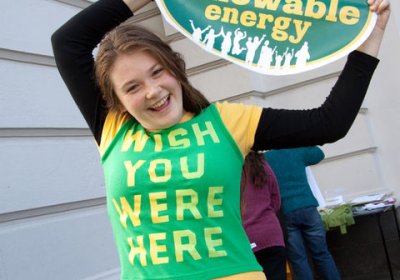The US's worst-ever environmental disaster took yet another bad turn after British Petroleum's (BP) latest efforts to stop the torrent of oil from the Deepwater Horizon well failed.
Public discontent is growing, with increasing calls for a government takeover of the operation and seizure of BP’s assets.
The Deepwater Horizon oilrig exploded on April 20, killing 11 workers and releasing between 19.7 million and 43 million gallons of oil into the Gulf of Mexico.
Environment
One sentence in the final declaration of the Search Foundation’s Left Renewal Conference (From Global Crisis to Green Future) captured the key issue: “Capitalism has been unable to address inequality, war and ecological degradation, and must be replaced by a democratic system that puts human need before greed, and socialises wealth instead of debt.”
Dutch prosecutors fired the opening salvo on May 31 in a notorious case involving a Swiss-based oil trader which dumped hazardous waste in Ivory Coast, the British Morning Star said on June 1. The dumping was allegedly to save itself the paltry sum of €400,000 (about A$576,000).
The article said prosecutor Luuk Boogert accused oil trader Trafigura AG and local authorities of putting “self-interest above people’s health and environment” at the criminal trial in Amsterdam. The ship had docked at Amsterdam en-route to Ivory Coast.
The most serious controversy that has emerged in the climate movement this year is probably about the role of natural gas in a transition to a zero-emissions society.
The national climate summit in March did not debate gas, but decisions taken there have influenced the debate. A decision of that summit was to campaign to “replace Australia's dirtiest coal-fired power station, Hazelwood, with clean energy by 2012”.
The Rudd ALP government was elected on a promise to take serious action on climate change. Yet it hasn’t acted and Australia’s greenhouse gas emissions — already the developed world’s worst per person — are on the rise again.
In late May, the Department of Climate Change announced emissions had risen in the December 2009 quarter, rebounding from a dip caused by the global economic crisis. Most of the rise came from the energy sector, said the May 28 Sydney Morning Herald.
The Electrical Trades Union (ETU) has banned its members from working in uranium mines, nuclear power stations or any other part of the nuclear fuel cycle, AAP said on May 31.
The union says uranium is the new asbestos in the workplace. The ban will apply to ETU members in Queensland and the Northern Territory and breaching it could lead to expulsion, said ETU Qld secretary Peter Simpson.
In recent weeks, the big mining companies have spent millions on propaganda against plans to make them pay more tax. But the results of a June 1 Newspoll showed they have hardly made a dent on public opinion.
Both big parties are losing ground, the poll said. Labor’s primary vote dropped two points, to 35%. The Coalition went down by the same margin, from 43% to 41%. But the bombshell was the record Greens vote — up four points to 16%.
This is not a new trend. Support for the Greens has risen steadily over the past decade.
Israel faces unprecedented pressure to abandon its official policy of “ambiguity” regarding its possession of nuclear weapons.
Israel’s equivocal stance on its atomic status was shattered by reports on May 24 that it offered to sell nuclear-armed Jericho missiles to South Africa's apartheid regime in 1975.
The revelations are deeply embarrassing to Israel given its long-standing opposition to signing the Nuclear Non-Proliferation Treaty. It has argued instead that it is a “responsible power” that would never misuse nuclear weapons technologies if it acquired them.
The melting of the Arctic ice cap is one of the most foreboding signs of dangerous climate change.
If too much ice melts, it will set off natural feedback loops that warm the planet even faster and disrupt weather patterns.
A month ago, satellite data from the US National Snow and Ice Data Center (NSIDC) suggested the Arctic sea ice was growing back. In early April, the ice cover was close to the 30-year average.
But in recent weeks, the NSIDC has recorded a rapid drop in ice cover. By late May, the ice cover had dropped below what it was in May 2007 — the lowest year on record.
At the G20 Economic Forum in Pittsburgh in September, President Barack Obama said his administration would combat climate change by phasing out the US government’s grandiose subsidies to the fossil fuel industry.
But a report released on April 13 by Synapse Energy Economics (SEE) said Obama hadn’t followed through on his promise to cut dirty energy handouts.
The following is abridged from a motion unanimously passed on May 22 by the general membership of the Climate Emergency Network, Victoria. For more information on CEN, visit the group's website.
***
Over the past decade or so, a climate movement has developed in many countries, both developed and developing. There has been a tendency for the climate movement in North America, Europe, and Australia to focus on ecological modernisation as a climate change mitigation strategy.
Dozens of campaigners have hit Melbourne’s streets to campaign for the Hazelwood power station to be shut down. Climate action groups in the inner city are doorknocking thousands of homes every weekend to get the message across.
Hazelwood is Australia’s most polluting power station. Climate campaigners have targeted it with protests since the state government extended its operating licence until 2030. It was originally meant to be closed down and replaced in 2005.
- Previous page
- Page 291
- Next page







